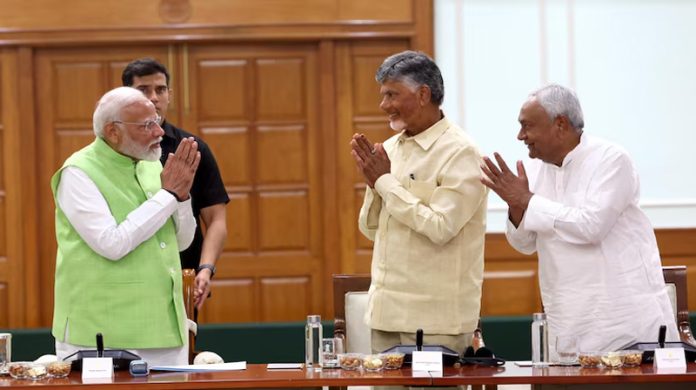Dr Satwant Singh Rissam
June 4, 2024, results for Lok Sabha elections brought third term victory for the Bhartiya Janta Party (BJP) and to make complete sense it was the National Democratic Alliance (NDA) coming back to power. That day it also turned the clock for the BJP because by not getting a majority after ten years of government they felt the true need for its allies in the shape of NDA which helped Atal Bihari Vajpayee as well. The verdict of 2024 has made the BJP dependent on the Telugu Desam Party (TDP) and Janta Dal(U) entirely. Despite being suddenly in such a situation, looking ahead BJP celebrated the results of Lok Sabha elections across the country.
But with such results the internal dynamics of the new government vis a vis BJP will be different in coming months. To state that simply, BJP and Prime Minister Narendra Modi have taken a route of consensus this time as till now PM Modi has never had a chance to run a coalition government. Although PM Modi in his maiden speech after the election results declared that NDA would continue to make big decisions in its third term, but BJP may have to keep aside its core issues while running the NDA government and reinvent the idea of cooperative federalism. The task of running a coalition NDA government is now on PM Modi because many difficult decisions the PM may take could be blocked by the allies if it impacts their voter base in any way.
Because of this, the new political dynamics that PM Modi and Home Minister Amit Shah invented while running a majority government will be visible a little less this time. Such changes can be witnessed within the new cabinet formed. Because of power-sharing many of BJP’s major faces were dropped from the new cabinet. Let’s also not forget that some prominent cabinet faces of previous Modi government were defeated because of several political reasons on ground. This has brought mixed feelings for BJP as instead it inducted new OBC, and women faces in the newly formed cabinet. It reflects the BJP’s plan to face combative opposition in Parliament this time led by the Congress party. At the same time, BJP’s narrative of giving a stronger government wasn’t achieved which has given Congress an edge in Parliament.
For BJP the results in the Jammu region were on expected lines as Jammu and Udhampur seats were retained by the party. However, on both seats of the Hindu majority region, the results witnessed a dip in victory margin. So, this significant dip this time will be an area of concern for the party. On the other side in Kashmir, the Muslim majority region, voters threw a shocker by making jailed terror funding accused and independent candidate Engineer Rashid victorious against Omar Abdullah in Baramulla. Similarly, the Mehbooba Mufti faced defeat at the hands of National Conference’s Mian Altaf Ahmed by around 2.81 lakh votes in the Anantnag – Rajouri seat. With this, both key faces of the Abdullah and Mufti families were left out of the important political battle of 2024. Because on both regional sides sentiments were different after 2019 and the results are a message for the new government in Delhi. Besides, it became more important as the BJP-backed candidates Zaffar Manhas of Apni Party and Sajad Lone of J&K Peoples Conference lost on both Kashmir seats. Jammu & Kashmir voters have spoken boldly through votes but silently to reclaim the political space in their respective regions.
For the BJP, who must be preparing for assembly elections in Maharashtra, Haryana, and Jharkhand, these results will set a future path where the focus on the past will remain present in their plans. One of the different tasks this time for BJP will be to work on coalition strategy because explosive statements to communicate narrative during campaigning won’t pay to the NDA and in some situations may instead cause moral defeat to this alliance. Therefore, the entire politics of BJP this time will embrace many new things not witnessed in the last ten years.
Trending Now
E-Paper


